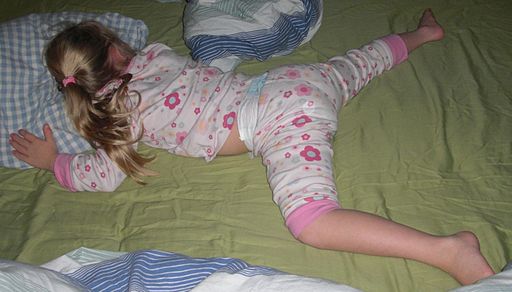Sleep Advice
Sleep; we all need it and to not get the good quality stuff can lead to all kinds of problems. No wonder we think about children, young people and sleep. We want our children to get the best sleep they can so they wake up refreshed and ready for what the day throws at them. On top of that, parents need good sleep too! Having a child that unsettles your day or night because of sleeping habits or patterns that are out of kilter can be challenging and that’s why Rose Maxwell answers a few sleep based questions here. Let us know through the comments below or even use our contact form if you have any other questions.

By Naploaha (Own work) [CC BY-SA 3.0], via Wikimedia Commons
How much sleep does a child need and what difference does age make?
There is no magic formula for children’s sleep but it is useful to know what the averages are: Babies sleep about 18 hours a day, preschool children sleep about 12 hours a day and Primary aged children need average of 10 hours. teenagers need 8 1/2 to 9 hours and adults 7-8 hours
Our five year old seems to only settle in our bed. I don’t mind so much but it spoils my sleep and I am not sure if this is healthy?
Many parents start letting young children sleep with them at times, perhaps with a baby it is easier to get them to sleep this way, and of course the warm cosy bed next to the secure parent can become a habit that is difficult to stop.
It can be a very positive thing for both parent and child increasing attachment and building security. It is something that is very hard to give up for the older child but becomes difficult in many practical and emotional ways as the child grows older and can cause a great deal of stress and conflict in the family.
Parents need their sleep and privacy too and in this sense it is unhealthy to feel that the child’s needs dominate when what they want is not working for the adults. The parents can feel trapped into lying down with the child in order to settle them. It can feel impossible to get the child to sleep without the comfort of the parents being physically present.
In that sense it can be an unhealthy thing for the whole family if the parents feel unable to settle their child in their own bed and have time for themselves. In the end it is a habit like any other and with kind firm but fair persistence and explanation, even perhaps with rewards the child will learn to sleep on their own if the parents are committed to this path.
At Brighton Therapy Service we help parents work to manage a range of difficult behaviours including sleep patterns and find that once the commitment is really there is possible to change even the most persistent habits!
My teenage son seems to want to stay in bed until lunch time whenever he can. Should I be concerned?
Many parents do get very concerned that their teenagers seem to sleep for England! There is actually a physiological reason for this: that the hormones lead to changes in sleep patterns so that the teenager’s clock seems to be on a 25 hour cycle, so teenagers naturally tend to stay up later and then of course sleep in too. It can be very annoying for the family because there also seems a psychological aspect to this – an element of wanting to separate from the family, not being up and not taking part in the family’s day perhaps. There are cultural reasons too in the peer group teenagers want their own company and this can involve staying up late at night.
So, there are physical reasons that teenagers’ sleep patterns change because of their hormonal development, and psychological reasons too. Having said this as with any behaviour it is very important that the family negotiate together ground rules and if there are tasks that need to be done, commitments to honour and the wellbeing of other family members at stake then of course one sleepy teenager’s wish to stay in bed should not dominate the whole family.
There can be give and take in this area as in all others, there are times when sleeping in is ok for others but there are times when it is not working for the rest of the family and working together well is a particularly healthy goal for families to achieve in teenager years, teaching good negotiation skills and mutual respect as core family values.
At Brighton Therapy Service we work with young people to help them to understand and manage the impact of their own behaviour on others, and to improve self-awareness and reflective capacity in teenagers.
Get in Touch
This was written by Rose and you can contact her here.




Comments